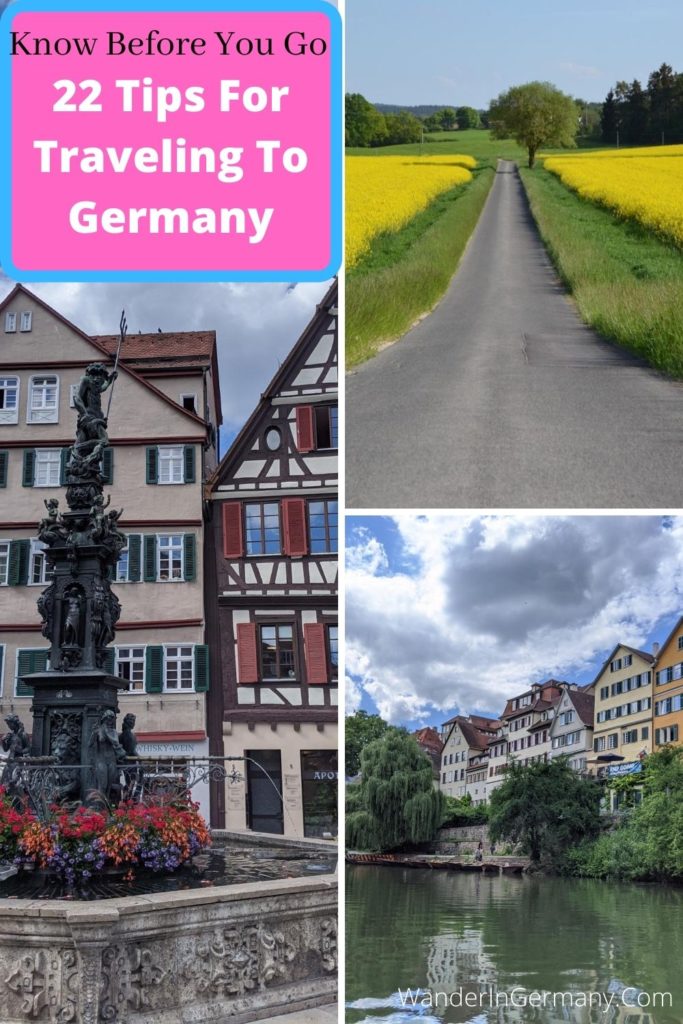[This post may contain affiliate links where we earn a small commission. Please see our disclosure for more information and thank you for supporting our site so we can continue to bring you awesome content for your travel inspiration!]
Whether you are traveling to Germany for the first time or are just looking for more insight into German culture, one thing is for sure. There are some really fun, interesting, and slightly confusing quirks to living and traveling in Germany! After years of living here as an ex-pat, I find myself STILL discovering things that I wish I had known before exploring. Here are my top 22 Germany Travel Tips.
Looking for more info on planning your trip to Germany? Start Here
^Planning a Trip To Germany? Pin It!^
General Etiquette
They Are Not Rude People.

One of the most important things to know before visiting Germany is that the people are actually really friendly…if you get to know them!
I’ve heard so many people quip that Germans are rude. They aren’t. They are just very private people and with a completely different sense of humor than what Americans (and many other westerners) are used to. Just because you don’t get a friendly smile from the waitress or bus driver does not mean that they aren’t friendly people.
Don’t Ask “How are you?”
You know how when you are at the store and the clerk says “How are you today?” and without even thinking of a response, you reply “Good, and you?”
Yeah. NOT going to happen in Germany. If you ask a German how they are doing, expect to be told just how they are doing. That means you might get a story about how they are really tired from not being able to sleep because their dog kept yapping last night or how they are excited to be going to the Volksfest tonight. You might be taken aback by just how open they are (considering just how private they typically are!)
The Weather
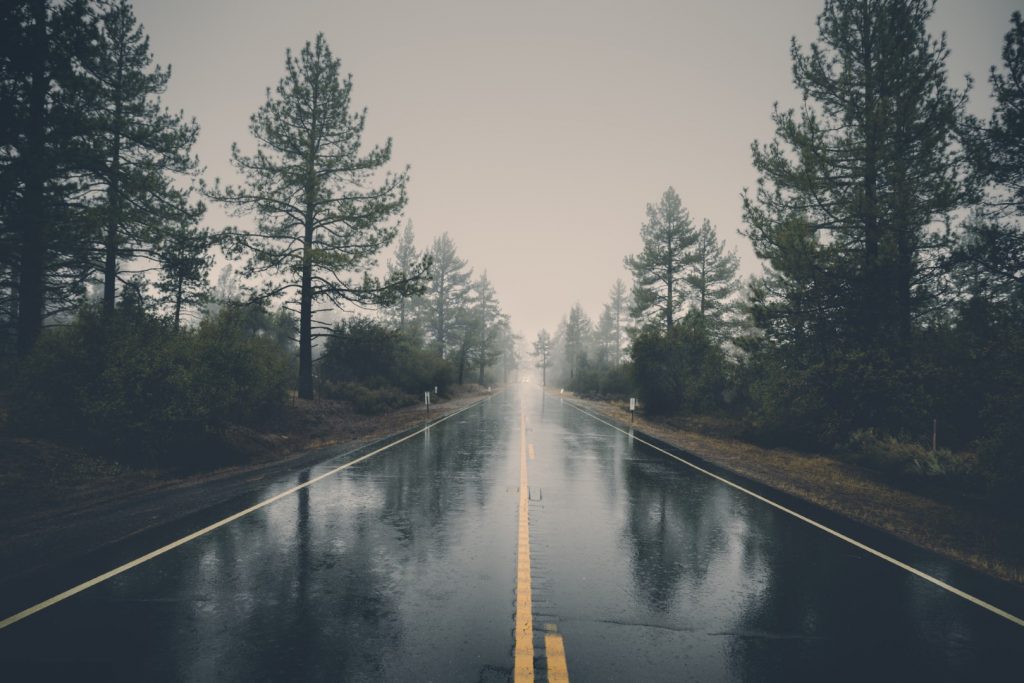
I love every single season of Germany, and there truly are all four here. Autumns are gorgeous with the stunning colors of the fall. Winters are romantically wonderful as snow drifts down on the castle you are attending the Christmas Market at. Spring brings the most brilliantly, bright yellow bursts of color in the fields (oh and a lot of allergies!). Summer is hot, but not toooo hot (most of the time) making the long days perfect for exploring.
The only thing to be weary of is rain. Always be weary of rain. It looks like a bright, sunny day? Don’t be fooled. It could very well rain on you in 3 hours.
Always Carry Cash
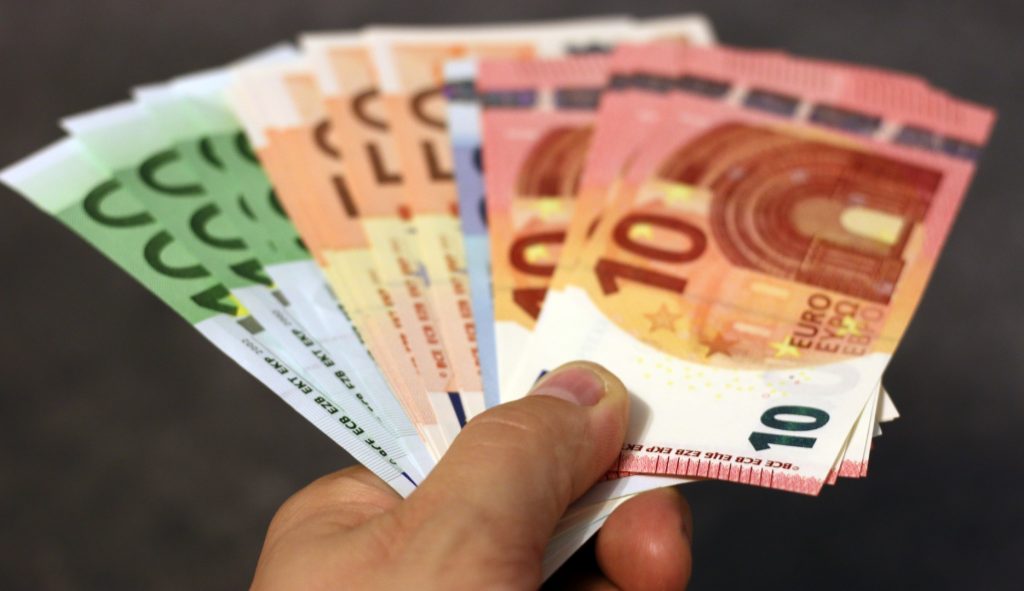
….and Umbrellas.
If there are two things you must always have on you, it is cash and an umbrella.
Money In Germany
Germany uses the Euro. This is really handy because one of my favorite things about Germany is just how quickly you can be in other countries. Want to go to Salzburg from Munich? No problem, you can be there in a few hours. Want to catch a short, cheap flight to Rome? Sure! The nice thing about Germany being on the Euro is that you don’t have to change over cash if going to too many other nearby countries.
Credit cards are actually becoming more and more popular in Germany. It used to be that it was very hard to find places that took plastic, but that is rapidly changing. However, you just never know when you’ll be at an establishment that will only take cash.
Coins. Not only do you need cash, but you need coins. Germans get VERY put off having to give back small change. I can’t recommend bringing a coin purse with you enough. One of my top tips for going to Germany is to get small change as soon as you can.
Eating Out In Germany
Tipping In Germany
Speaking of money, one thing that shocks many Americans is the tipping system in Germany. The easiest rule of thumb is to just round up your bill. You are not required (or even expected!) to tip 15% in Germany. Waiters and waitresses in Germany get full wages, health insurance, and the whole shebang of worker’s rights. Therefore, you can tip truly based on the service, or just round up.
For example, if you had a 27 Euro restaurant bill, it’s fine to give 30 Euro and say “No change.” However, if your total was 29, it is still respectable to leave a few Euros.
Want To Know What To Eat In Germany? Here are My Faves!
Water Is Not Free
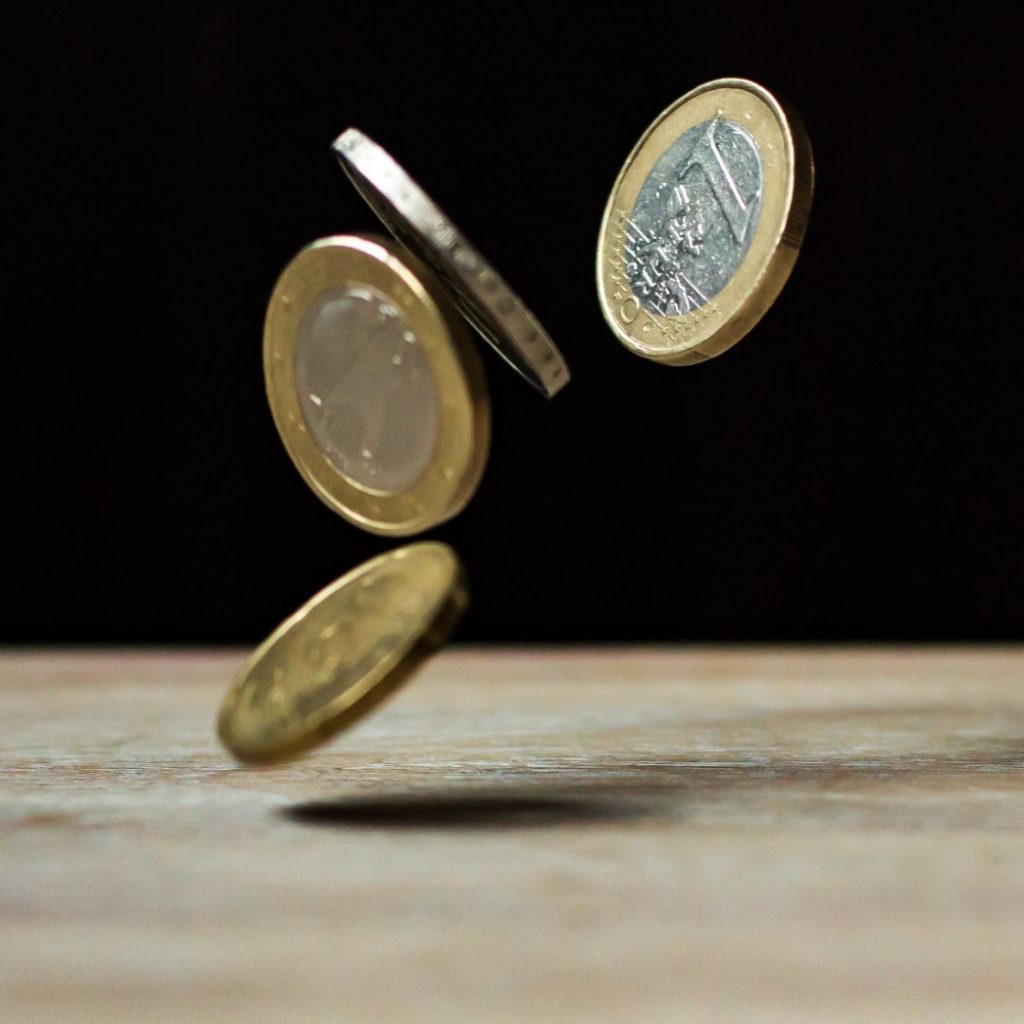
There are so many things Americans totally take for granted not paying for, like tap water at restaurants.
I remember the first time I got the bill after ordering a water. Granted, I wasn’t overly surprised because instead of a tall glass of ice water, I was brought a fancy bottled water. Ok, my mistake. I won’t make it again.
So, the next time, I was sure to be real clear on my intention of water consumption. “Ich mochte leitungswasser” (I’d like TAP water).
Aha! Out came a normal glass just filled with water. Huzzah!
Then came the bill….with a charge for water! What!? It took many conversations with locals to finally figure out that SOME places may give you tap water (albeit they’ll think you are disgusting for asking for such a thing) and some will downright tell you they only do bottled water (Germans think that tap water is “less than.” )
Water is not only not free but it’s also filled with Gas
The other big mistake I first made when ordering waters (wasser) at a restaurant was to always distinguish “Ohne gas” (without gas) if you don’t want carbonated water. Carbonated water is often the norm unless you clarify. I’ve now come to love “bubbly water” (as my son calls it) but if you aren’t used to them, it’s best to always ask for it “Ohne gas” (If you DO want gas, say “Mit gas”)
Water is not only not free and bubbly but there is no ice!
Sticking to the water theme, I can’t remember one visitor that has come to visit us in Germany that hasn’t commented on “Where’s the ice??” when ordering sodas or waters. It just isn’t a thing here! I never noticed because I actually never drank pop with ice before moving to Germany (I guess it’s just a sign I was supposed to be here, eh!?)
Getting Your Bill (or waiter’s attention)
Remember above how some people think Germans are rude? One reason is because at restaurants, waitresses will buzz around from table to table but never stop at yours.
Forgot to order that side of fries? Where is your beer refill?? You sit there waiting and waiting…and waiting and she never comes back to your table. How rude. Doesn’t she want a good top for being hospitable?
Actually, Germans find it rude to be interrupted every time their glasses are filled after one sip or having to stop conversation to nonchalantly say that the food is good. Eating is a communal time and is to be spent enjoying the company at the table.
Another one of the many important things to know before going to Germany is therefore how to get a waiter’s attention.
It is not rude to do a polite wave or hand raise to get the attention of your server or gently say, “Entschuldigen” (Excuse me). Then simply quickly ask for your request such as, “Noch eins Bier, bitte!” (Another beer, please!) or for the bill.
Bathroom Business
Paying To Pee
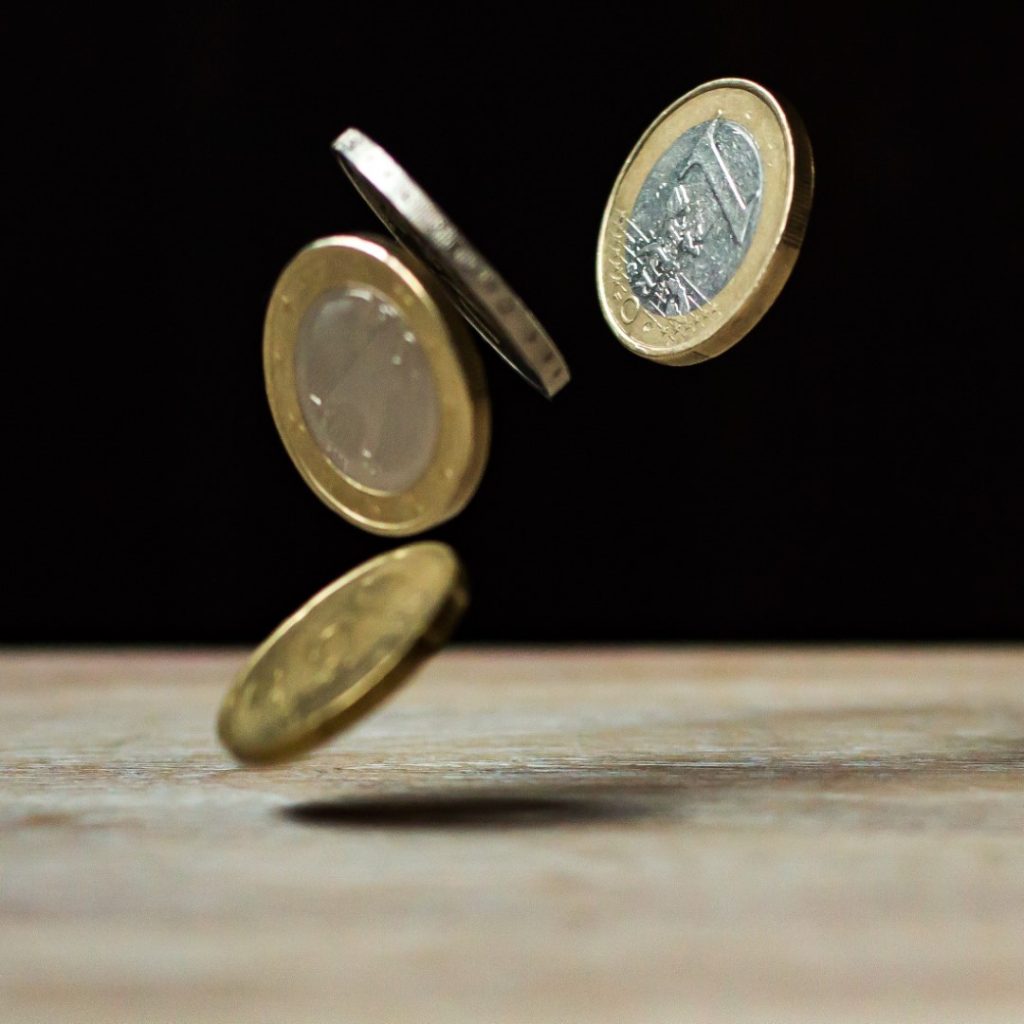
Speaking of always carrying coins, another reason to always have coins is that while you’d like to think that peeing is free, it just might not be!
Expect places like rest stops or public restrooms (even ones at places like some beer gardens) you’ll be expected (or even required) to pay to use the restroom. It ranges from about .50-.70 cents and supposedly is for the upkeep and supplies (and there is often an attendant there giving you a mean mug until you drop those coins in the dish).
At rest stops, you’ll often get a voucher that you can use to purchase something there for a few cents off.
Flushing The Toilet
While we are on the topic, I find it absolutely hysterical watching newbies’ responses coming out of bathrooms. Hear me out…They often come out of the bathroom saying, “I had no idea how to flush, so I just left in a panic!”
When in doubt, look up above the toilet. You’ll often see one large button and one small one. Use the small one for #1, the big one for larger jobs. Other times, in particular older buildings, there might even be a pull string on a tank above the toilet.
Recycling
Recycling and Trash are serious matters.
Fun fact: Germans can technically get fined for not recycling. Now, to be fair, I’ve never heard of anyone actually getting a ticket, but the point still stands that they take recycling VERY seriously.
While the recycling system can get intense at a German home or homestay, just try your best if staying in a place like an Airbnb.
When out and about, always look for the different colored bins. The main ones that you will most likely see when out sightseeing are:
Behälterglas: This bin is green and is for all glass bottles (some public locations will have a “weissglas” and “grunglas” separate containers. This just means separate your clear, green, and brown bottles.
Verpackung: This bin is yellow and if you are at a homestay, you might see a “Gelbesack” or “Yellow Sack” and is for all plastics.
Papiermüll: This blue bin is for anything paper related (pizza boxes, papers, cardboard, etc)
Note: Tetra packs (aka packaging that has both paper and plastic, such as milk containers actually go in the yellow bin)
Restmüll: Finally, just the general “trash” bin might be red. If you’ve looked at all the other containers and don’t think it fits into any of the above categories, you can dump it into the Restmüll
Bio: A Bioabfall bin is for food scraps, coffee grounds, etc but you’ll most likely only see this at homes, but they are popping up at more eco-concious locations, also.
Words To Know:
Pfand
Speaking of recycling, one concept that seems to frustrate Germans with tourists is their Pfand system. What is a Pfand? In short, it’s just a deposit on something (a bottle, a Maß at a fest, a mug of Gluhwein at a market, etc).
German Travel Tip: If you get a Pfand for any of these items, it’s not uncommon for them to give you a chip (like a poker chip) and when you return it back to them, you’ll get a deposit back. So, know that when you buy that delicious Gluhwein, the sign may say that it is 3 Euro, but you may have to pay 5. When you return the mug, you get your 2 Euro back.
Alternatively, there are also pfands on bottles you’ll get at the store, gas stations, etc. Just look for the little recycling sign on the back. If you are the kind of traveler that likes to shop locally, keep all these bottles and next time you go to the grocery store (or Getrankemarkt/ Drink shop) there will be a little kiosk where you can return all your bottles. It is sometimes shocking how much you get back…enough for at least a few more bottles of beer! Score!
Looking For Drinks Other Than Beer? Here Are 20 Great Drinks in Germany
Sleeping Arrangements
It is not uncommon to find beds in Germany a bit different than what we are used to in the US, especially when staying at a Gastehause or AirBnB.
For some strange strange reason, Germans often take two small mattresses (about a twin size) and shove them up to one another. For all your cuddlers out there, this creates the most awkward and uncomfortable crevice between you and your lover! On these styles of beds, you’ll each also get your own giant down duvet as well. Now, THIS has its perks for those of us with partners who are sheethogs!
And then come the pillows. To be honest, I’m not even sure why Germans bother with them. You’ll get one (sometimes 2) giant, square pillows. Sounds luxurious, right? Wrong. They are absurdly flat and even when piled on top of one another, you’ll wake up halfway through the night wondering how the heck TWO pillows can now be flat. It’s a German mystery.
Accommodations When Traveling With A Family
If you are traveling with a family in Germany, it can sometimes be hard to find a 2 bed room at a hotel (like the 2 queens that are common in the US). This makes it pretty difficult depending on the age of your kids because this sometimes means needing to get two rooms instead of just one (which can also add up quickly financially). If you want your best chances at a room with two beds, look into Familial Hotels, Chain hotels (like Radison, Hilton, etc) or AirBnBs.
Tip: When searching for AirBnBs, many Germans consider all rooms in the house as “rooms” (where as Americans only think of bedrooms as “rooms”) therefore, be sure to use the filter if you want 2 BEDrooms, otherwise, it may come up with results for one bedroom accommodations (that have another room, like a family room).
What Is Closed On Sundays?
While you’ll read that most of Germany is “Closed” on Sundays, that is a bit of an exaggeration in towns that are frequented by tourists. Main tourist attractions, like Neuschwanstein Castle will yes, still be opened on Sundays.
However, it is still best to just do a double check of what is on your itinerary for the day. Some museums may be closed, many mom and pop restaurants won’t be open, and if you are a shopper, many shops close on Sundays as well. Sunday is a time for family and relaxing. So, do as the Germans do. Take your Sunday as a day to find a Biergarten, riverside location for a quick dip, or find a cafe for a kuchen (cake) and coffee! It’s a wonderful time to people watch and slow down.
Driving
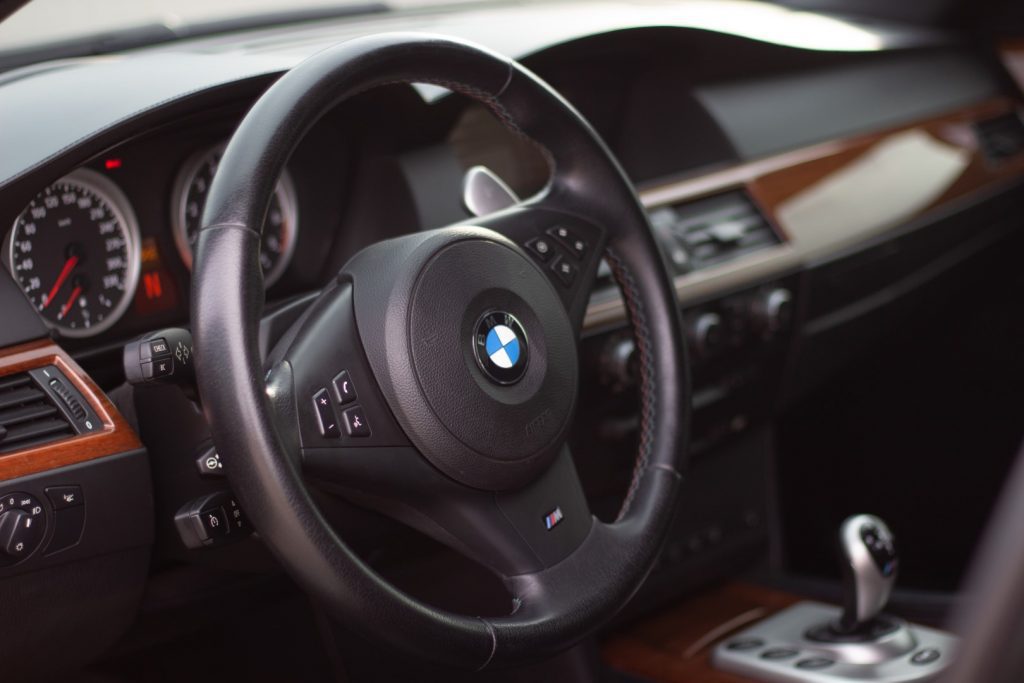
Know a few basics.
Driving in Germany really isn’t hard or scary once you get behind the wheel. The two biggest differences to really remember are:
- ALWAYS drive on the right. Pass on the left. DO NOT be caught cruising along in the left hand lane on the Autobahn
- Give way to the right. If you are driving in a city or residential area, drivers to the right of you have the right of way on many roads. Look for a big yellow diamond. If you don’t see one, then you best be stopping for them on your right or risk an accident. (The yellow diamond shows who has priority)
Yes There are Speed Limits
The first question I get from a lot of people about Germany is, “Is it true there are no speed limits in Germany?”
Yes.and no.
Only on some sections of the Autobahn are there no speed limits, everywhere else, speed limits absolutely do apply.
RULES RULES RULES
Oh, Germans LOOOVE their rules. And they are very good at following them, too. It’s a fascinating cultural thing to watch, actually.
As a tourist, some “rules” to pay attention to are things like:
Jaywalking: Germans have an actual phrase for Jaywalking and it is something about being a “child murderer” (I kid you not) They take that little green man light very seriously. You should, too.Bike Paths: Oftentimes, you may not even realize that what you are walking on isn’t the sidewalk at all, but the bike path. Lord have mercy on your soul! Move over!
Pass On The Left. As mentioned in the driving section, if you have decided to drive on the Autobahn, you better not be hanging out in the left lane. Do you really want a fancy BMW coming barrelling at you at 200 MPH as you peter along??
Mundschutz: Currently, there is a face mask rule due to covid. We aren’t talking about people’s rights being taken away here. It is the rule. You WILL follow it. Don’t want to? Then don’t expect to be let into that gas station, on the bus, or anywhere else that is requiring it. NO debates.
Obviously, these aren’t the only “rules” in Germany, but again, it’s just a very interesting cultural experience when a rule is in place if it is for the common good, then everyone obliges.
Lines
Germans love rules…except when it comes to lines. I’m always flabbergasted at this concept. For a culture of people who like to do things so efficiently, systematized, and in particular ways, why do they all just hoard together instead of making functional lines!?!? Beats me.
Don’t be rude, but if you find yourself in a line situation (ski lines are notorious for this!) then don’t be afraid to stand your ground. Simply keep up with the pack or risk having someone step in front of you.
Thank You For Not Smoking

One of the things to know when traveling to Germany is that smoking is not known as the evil cancer stick that we know it to be in the US. In fact, smoking is still extremely common in most of Germany. This isn’t to say that they think it is healthy or anything, but it is just culturally accepted on a much wider scale than it is in the US.
However, you will find in almost all restaurants, you can no longer smoke inside in Germany. Granted, if you find yourself at a Biergarten or any other outdoor cafe, this is not the case. It’s not unusual for someone to light up a cigarette right next to your child or in front of you as you walk. This is just something you’ll have to get over, unfortunately,
Shhhh, keep it down.
I never really knew how loud Americans (me included) were until I sat on a German train. I now find this to be a personal game. Pick out the Americans. It’s really not hard. They are usually the people talking unusually loud at a restaurant or on public transportation.
To “fit in” with Germans, or at least not scream, “Hi, I’m American!!” just speak in a quieter tone when out and about.
Don’t Be a Prude
Germans see nudity in a completely different light than Americans. A person’s body is not always just about sex. It’s just a body.
That’s why it’s not uncommon to have nude spas, nude beaches, and to even see porn mags just sitting out in plain sight at the gas station.
At first, this can be quite jarring, but once you realize that they don’t oversexualize everything about the body, the novelty starts to wear off.
Read My Ultimate Guide to German Spas (And Which Ones To Go To!)
Basic Words To Know
English is known quite well in most places that tourists will be. In fact, even in more off the beaten path locations, it is often not hard at all to find English. Just like anywhere that you travel, it’s always nice (and respectful) to have at least a few words of the local language (and of course don’t go about EXPECTING English).
Here are some words that are good (and easy) to have in your arsenal and (very) roughly how to say them.
Hallo: Hello. Pronounced like: “Hollow”
Tschuss: Goodbye. Pronounced like “Choose”
Ja/Nein: Yes/ No. Pronounced: “Yah/ Nine”
Bitte/Bitteschön: Please (can also be used as a “what?” if you need something repeated) Pronounced like: “Bittay Shone”
Danke/ Dankeschön: Thank you. Pronounced like: “Donkay Shone”
Genau: Yes/ Exactly. Pronounced like: “Gaynow”
Entschuldigung: Excuse me. Pronounced like: “End shooldigoon” (roughly!!!)
There are plenty of other short phrases to learn like “Where is the____” or “How much does this cost?” But if you just stick to even the above simple words, you’ll be on a good start!
There you have it. These are some of my top things to know before traveling to Germany. Hopefully with this knowledge in hand, you won’t be thrown through a loop and you’ll be able to enjoy your trip in Germany instead of getting worked up over the small details.
Have you traveled to Germany before? What other travel tips in Germany would you give to someone looking to have the best experience in Deutschland?

